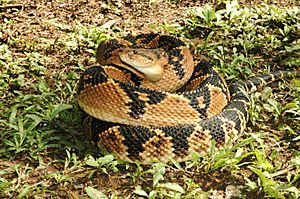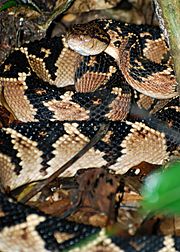Southern American bushmaster facts for kids
Quick facts for kids Southern American bushmaster |
|
|---|---|
 |
|
| Conservation status | |
| Scientific classification |
|
| Kingdom: | Animalia |
| Phylum: | Chordata |
| Class: | Reptilia |
| Order: | Squamata |
| Suborder: | Serpentes |
| Family: | Viperidae |
| Genus: | Lachesis |
| Species: |
L. muta
|
| Binomial name | |
| Lachesis muta (Linnaeus, 1766)
|
|
| Script error: The function "autoWithCaption" does not exist. | |
| Synonyms | |
|
|
Script error: No such module "Check for conflicting parameters".
The Southern American bushmaster, also known as the Atlantic bushmaster, is a large venomous snake. It belongs to the pit viper family. You can find this snake in South America and on the island of Trinidad in the Caribbean. There are two types, or subspecies, of this snake that scientists recognize today.
Contents
Snake Classification
Scientists group living things into categories. This helps us understand how different animals are related. The Southern American bushmaster is part of the Lachesis genus.
Different Types of Bushmasters
There are two main types, or subspecies, of the Southern American bushmaster. They are found in different parts of South America.
| Subspecies | Named by | Common name | Where it lives |
|---|---|---|---|
| Lachesis muta muta | (Linnaeus, 1766) | South American bushmaster | Southeastern Colombia, eastern Ecuador, Peru, northern Bolivia, eastern and southern Venezuela, Trinidad, Guyana, Suriname, French Guiana and much of northern Brazil |
| Lachesis muta rhombeata | (Wied-Neuwied, 1824) | Atlantic Forest bushmaster | Coastal forests of southeastern Brazil (from southern Rio Grande do Norte to Rio de Janeiro). |
What the Bushmaster Looks Like
Bushmasters are very long snakes. They usually grow to be about 2 to 2.5 meters (6.5 to 8 feet) long. Some can even reach 3 meters (10 feet)! The longest one ever recorded was 3.65 meters (almost 12 feet) long. This makes it the biggest of all vipers. It is also the longest venomous snake in the Western Hemisphere.
The Southern American bushmaster is the third longest venomous snake in the world. Only the king cobra and the black mamba are longer. These snakes usually weigh about 3 to 5 kilograms (6.6 to 11 pounds).
Its head is wide and stands out from its thinner neck. The front of its nose is rounded. It has small scales covering the top of its head. Its eyes are separated from its upper lip scales by several rows of tiny scales.
The snake's body is round and gets thinner towards the tail. It has 31 to 37 rows of scales along its back. These scales are rough and have bumps on them. The underside of the snake has 200 to 230 scales. Its tail is short. Like many pit vipers in the Americas, the bushmaster shakes its tail when it feels threatened. This can make a rustling sound in dry leaves.
The snake's skin color can be yellowish, reddish, or grey-brown. It has dark brown or black blotches on its back. These blotches often look like upside-down triangles along its sides. The middle of these patterns might be lighter in color.
Bushmaster Venom
The venom of the bushmaster is very powerful. Some studies have found that these snakes produce a lot of venom. However, it can be hard to study their venom. Bushmasters get stressed easily in captivity. This makes it difficult to collect enough venom for research.
The bushmaster's venom can cause several problems. It can damage tissues and make blood unable to clot. It can also cause bleeding and affect the nervous system. If a person is bitten, they might feel pain and swelling at the bite site. Other effects can include dizziness, blurry vision, and stomach pain. Bites from this snake are very serious and need immediate medical help.
Why It's Called That
The name Lachesis comes from Greek mythology. Lachesis was one of the three Fates. She was believed to decide how long a person would live. This name fits the snake because its venom can be deadly.
The word muta comes from Latin and means "dumb" or "mute." This is because the snake looks like a rattlesnake and shakes its tail when scared. But unlike a rattlesnake, it doesn't have a rattle to make a loud noise. However, when it shakes its tail in dry leaves, it can still make a noticeable rustling sound.
Other Names for the Bushmaster
This snake has many different names depending on where you are.
- In Trinidad, it's called mapepire zanana or mapepire grande.
- In the Amazon Basin, it's known as surucucú.
- In Peru, people call it shushúpe.
- In Bolivia, it's known as pucarara.
- In Venezuela, it's called cuaima or cuaima piña.
- In Colombia, it's known as verrugosa or verrugoso because its scales look warty.
- In Suriname, it's called makasneki and makkaslang.
- In the Kwaza language of Rondônia, Brazil, it's called ĩtsãi.
- In the Shawi language of Peru, it's called na’shi.
Where Bushmasters Live
The Southern American bushmaster lives in the equatorial forests of South America. These are the forests east of the Andes mountains. It also lives on the island of Trinidad. These snakes prefer both old, untouched forests and newer, regrowing forests. In Trinidad, they often live in hilly and mountainous areas.
What Bushmasters Eat
Bushmasters are predators. They mostly eat small animals like rats and mice. Sometimes, they might also eat birds or other reptiles. Spiny rats are a favorite food in Costa Rica. Rice rats and agoutis are also common prey. Other animals they might eat include porcupines, squirrels, opossums, squirrel monkeys, and frogs.
See also
 In Spanish: Lachesis muta para niños
In Spanish: Lachesis muta para niños
 | Audre Lorde |
 | John Berry Meachum |
 | Ferdinand Lee Barnett |



